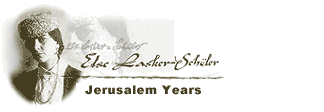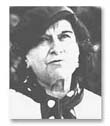
 Strutting
through the streets of Berlin in the 1920s decked out in outlandish clothes
and garish Jewelry was one thing. This was after all the flapper era that
brought Kurt Weill, Bertold Brecht, Lotte Lenya, and Marlene Dietrich
to the fore. Whether by chance or by design, the poet in this café-society
was in tune with her times. Yet to wear the same kind of regalia in her
seventies, in a Jerusalem full of economically struggling immigrants,
was quite another matter. Strutting
through the streets of Berlin in the 1920s decked out in outlandish clothes
and garish Jewelry was one thing. This was after all the flapper era that
brought Kurt Weill, Bertold Brecht, Lotte Lenya, and Marlene Dietrich
to the fore. Whether by chance or by design, the poet in this café-society
was in tune with her times. Yet to wear the same kind of regalia in her
seventies, in a Jerusalem full of economically struggling immigrants,
was quite another matter.
Like the ant of the
fable, the hard-working populace of the Holy City must have regarded the
poet as something of a parasite. Just being a Yekkeh, a Jew of
German origin, was a stigma in those days. And the fact that she continued
to write in German in a fiercely patriotic country where all the other
immigrant-poets readily adopted Hebrew as their poetic tongue only alienated
her further. In a prose piece titled "Antisemitismus" Lasker-Schüler
writes, "After escaping the death throes of anti-Semitism, it is
the faithless claw of my own people which now tears me apart."
 |
From:
Bernhard Frank "Eve's Song: Observations on the Poetry of Else
Lasker-Schüler." Judaism:
A Quarterly Journal of Jewish Life and Thoughts 47: p. 299.
Reprinted with permission from Judaism, vol. 47 no. 3 (Summer
1998). Copyright © 1988 American Jewish Congress.
To subscribe to Judaism, please call: 212-879-4000; fax 212-249-3672;
or write: Judaism Circulation Office American Jewish Congress 15
E. 84th St. New York, NY 10028-0458; email:
judaism@cats.ucsc.edu
|
LASKER-SCHÜLER Introduction
|

